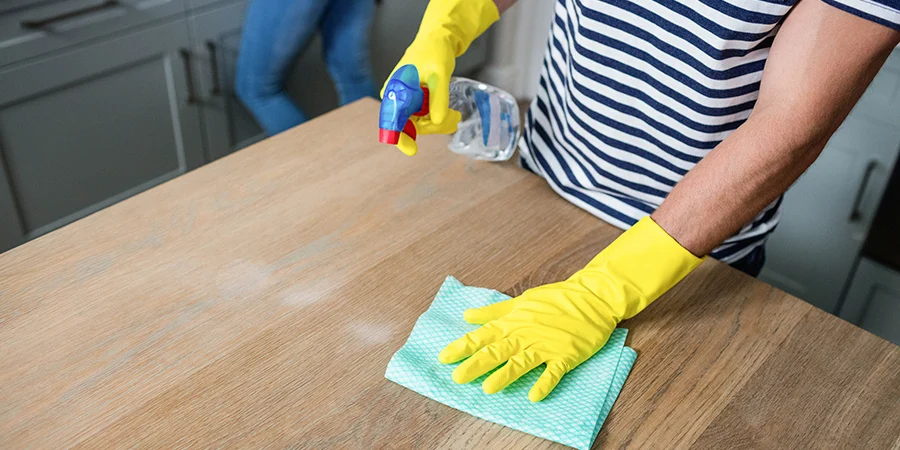The coronavirus pandemic has struck the nation and has forced us to be more self-aware of our interactions not only with other people, but with our environment. The Centers For Disease Control and Prevention (CDC) recommends practicing social distancing to prevent the spread of the virus. But how can you properly clean your apartments to ensure COVID-19 isn’t infecting your space?
Disinfecting AND Cleaning
Most people don’t know it, but there’s a major difference between cleaning and disinfecting. Cleaning is when you wash or wipe a surface in order to rid it of dirt or grime. This method might remove germs from a surface, but it does not kill them. Disinfecting using chemicals kills the germs that are present in our living spaces. This method kills the bacteria, but might not leave your space looking clean.
Although there is not exact certainty of the behavior of the COVID-19 coronavirus, studies suggest that coronaviruses live on surfaces anywhere from a few hours to several days. Because of this, it is important to clean and disinfect the surfaces regularly. Cleaning and disinfecting is the only way to fully sanitize your apartment.
Tip: Vinegar can be used as a cleaning solution replacement, but does not kill germs. Pair vinegar with hydrogen peroxide, which has disinfecting qualities.
Places to Sanitize in Your Apartment
Most apartment renters will wipe down their kitchen countertops after cooking a meal and clean their bathroom surfaces once or twice a week. But what changes in regular cleaning habits can be made during a health-conscious time such as this one?
Start by thinking about everything that is often touched in your apartment. This includes doorknobs, handles and countertops. Coming home after picking up take-out food or visiting the grocery store can bring in unwanted germs. Embrace anti-bacterial wipes and clean the handles that you and your roommates regularly use.
Tip: Carry sanitizing agents for your hands around with you to help prevent the spread of germs. Tea-tree oil is known to be a natural antibacterial product, and can be mixed with water to create a spray.
Places You Might Not Think to Clean
During the COVID-19 pandemic, sanitization of irregular places becomes of utmost importance. Here are some places to clean that you might not think of normally:
Doors
You might have thought about doorknobs, but what about where we push on a door?
Washing Machines
With extra time spent at home, you are likely using your washing machine more than usual. Wipe the crevices in your washers of leftover little fibers that didn’t make it through the filter.
Kitchen Drawers
Give your kitchen drawers a good clean by removing and cleaning the contents and then wiping the inside.
Cutting Boards
Cutting boards, especially wood ones, hold bacteria in the cop lines. Using vinegar and peroxide, wipe down your cutting boards after using them.
Your Phone
You might not think about it much, but your phone travels everywhere with you. Clean your screen and buttons with an electronic-safe wipe.
Extra Time to Organize Your Apartment
We all are doing our part to prevent the spread of COVID-19 the best that we can. All non-essential workers are asked to stay home and work remotely. Extra time spent in your apartment means extra time you have to focus on cleaning.
Regularly washing clothes, blankets and towels keep the spread of bacteria to a minimum. Wash items of clothing that you’ve worn outside of your home regularly. By putting your laundry away and avoiding clutter, you make it easier to sanitize surfaces in your home. If you are washing a sick person’s laundry, follow these steps from the CDC.
If you’re looking for other ways to spruce up your apartment while you’re home, try growing a garden in your Philadelphia Apartment.
Tip: Replace the time that you would normally spend on commuting as time to clean.
Staying Healthy In Your Apartment
Amid uncertainty driven by this health crisis, we are facing unprecedented challenges. Carlyle Property Management is taking every action to slow the spread of COVID-19 within our properties while continuing the day-to-day operation of them.
We have made the safety of our employees and residents’ top priority. We are mindful that even while we are prioritizing safety, this is a very fluid situation and requires constant monitoring.
Please email us or call on us if you have any questions or concerns and we ask that you abide by recommendations from the government and health officials and make every effort to stay safe.


